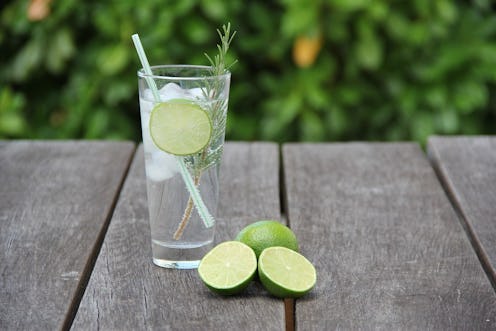"Ah, the sweet, sweet smell of pollen, weeds, and fungus spores," said no person who suffered from hay fever, or seasonal allergies, ever. People who are especially prone to the condition can experience various types of allergic reactions year-round, from sneezing to itchiness in the throat to nasal dripping (so sexy). While nature might be constantly letting you down, thankfully alcohol won't — that is, if you drink the right kind. Advice from Asthma UK indicates that a gin and tonic might be the best alcoholic drink to have with seasonal allergies.
Granted, a gin and tonic won't cure your hay fever (if only, alcohol gods!), but is a boon nonetheless — as many sufferers of seasonal allergies know, many types of alcohol exacerbate symptoms, landing you with your own secondary allergy-ridden hangover. In fact, 64 percent of people with allergies confirmed that alcohol had acted as a further irritant to their allergies in a survey. This is no coincidence — a lot of alcohols contain histamine, the same compound your body releases when it is combatting illness or allergies. The presence of it in alcohols like beer and red wine might trigger the body's response and result in asthma-like symptoms, or worsen allergic ones. Some alcohols, particularly wine, also have sulphites for preservation, which can also trigger the allergy-prone and asthmatic.
But your rooftop summer drankin' isn't entirely compromised, thank the solstice — because clear hard liquors like gin and vodka are low in histamine and sulphites, and less likely to trigger symptoms.
Of course, for people with asthma, they should by all means keep an inhaler on hand whenever they're drinking regardless of alcohol type, for the sake of safety.
Some people just have histamine intolerance in general, but whether it's allergy or asthma triggered or just genetic, it's also particularly helpful to know which foods to avoid that might set in symptoms. Histamine-heavy foods include a lot of citrus fruits (RIP, sangria), foods with vinegar in them like pickles and olives, nuts, cured meats, avocados, tomatoes, and some smoked fish. While for most people reactions aren't severe enough to warrant cut out entire food groups, it's always good to stay aware of what could potentially trigger symptoms (and maybe avoid, like, having avocado nut toast with sangria and a side of pickles all at once).
In the meantime, a cheers to gin and tonic and vodka on the rocks, true friends the pollen-plagued since the dawn of time.
